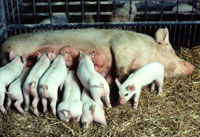Farmed Salmon Found to Contain PCBs
Okay, so you’ve read the latest word on mercury in tuna and changed your diet accordingly. But wait! We’re sorry to report that you might have to alter your fish intake yet again, in light of new findings that farm-raised salmon contain high levels of PCBs. In a study by the Washington, D.C.-based Environmental Working Group, 10 salmon fillets taken from grocery stores in San Francisco, Portland, Ore., and Washington, D.C., were found to have an average of 27 parts per billion of PCBs. That’s way below the 2,000 ppb standard set by the FDA — but high enough to raise eyebrows at the U.S. EPA, which assesses risk differently and sets far more stringent standards than the FDA. EWG, meanwhile, found the contamination alarming enough to recommend eating just one eight-ounce serving of salmon per month. Industry representatives and some federal officials lambasted the report for its small sample size and alarmist recommendations. PCBs, which cause cancer and problems with fetal development, have been banned in the U.S. since 1976.



